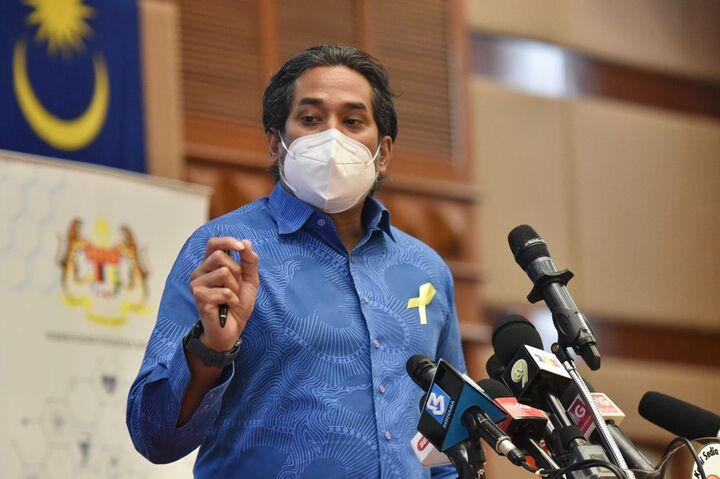KUALA LUMPUR, Nov 19 — The government has cancelled the Northern Region Cancer Centre project that was initially approved in 2018 for implementation under the 11th Malaysia Plan.
Health Minister Khairy Jamaluddin told Klang MP Charles Santiago that the project was cancelled by the Economic Planning Unit (EPU) under the Prime Minister’s Department in August this year.
Earlier, Charles had asked the Ministry of Health (MOH) to state its plan to build a standalone cancer hospital in Sungai Petani, Kedah.
“In relation to the standalone cancer hospital in Sungai Petani, the Northern Region Cancer Centre project was approved by EPU to be implemented under the Eleventh Malaysia Plan, Rolling Plan 3 (RP3 RMK11) in 2018,” Khairy mentioned in a written parliament reply on November 17.
“However, this project was cancelled by EPU on 26 August 2021,” he added, without elaborating on the reason.
According to the National Strategic Plan for Cancer Control Programme 2016-2020, there is no government radiotherapy centre in the northern region (Penang, Kedah, Perlis and North Perak), or on the east coast of the peninsula (Kelantan, Terengganu, Pahang). However, the Advanced Medical and Dental Institute (AMDI) at Universiti Sains Malaysia’s Bertam Indah campus in Kepala Batas, Penang, also provides oncology and radiotherapy facilities.
According to its official website, AMDI is the only cancer referral centre in north peninsula, under a public university, providing comprehensive expertise, equipment, and treatment comprising chemotherapy, radiotherapy, and brachytherapy.
“Buying and outsourcing of radiotherapy services from the private centres is costly in the long run,” stated MOH in the document, adding that it planned to construct a new radiotherapy and oncology centre in Sungai Petani by 2020.
“Currently, the main priority is to build a centre for the northern region based on the high numbers of cancer patients reported in the northern region and the absence of a government centre in this region.”
MOH only has five oncology centres with radiotherapy facilities: Kuala Lumpur Hospital; Sarawak General Hospital in Kuching; Sultan Ismail Hospital in Johor Baru; Women and Children’s Hospital in Likas, Sabah; and the National Cancer Institute (IKN) in Putrajaya.
Penang Hospital is an MOH oncology centre without radiotherapy services. A large number of cancer treatment services in Penang are concentrated in private hospitals.
At the same time, Khairy also noted that MOH is constantly working to increase the number of oncologists in Malaysia through two specialisation programmes.
That includes the Master of Medical Expertise Programme in collaboration with public universities under the Ministry of Higher Education (MOHE), where eligible medical officers will be given fully paid study leave under the federal scholarship (Hadiah Latihan Persekutuan).
Secondly, oncologists are also being produced through parallel pathway specialist programmes.
“MOH together with UA (public universities) is always working together to train more oncologists where every year, 13 slots for the field of oncology are provided by UA.”
Khairy stated that a total of 69 officers are currently pursuing oncology specialist programmes in the country, including 49 medical officers under the Master of Oncology Medicine specialist programme at public universities and 20 under the parallel pathway programme.
The recommended ratio of oncologists to the Malaysian population is 10 to one million.
Nevertheless, there were only 117 oncologists in the country in 2020. That is 2.5 times fewer than the recommended 300 oncologists for Malaysia’s 31.6 million population.
About 60 per cent of the 117 oncologists are in private health care facilities and only 30 per cent in MOH facilities.
Besides that, MOH has provided an annual allocation for cancer treatments such as surgery, chemotherapy, radiotherapy, brachytherapy, bone marrow transplantation, hormone therapy, immunotherapy, and targeted drug therapy.
In 2021, a total of RM136.4 million has been allocated for radiotherapy and oncology.
“Most of the allocation has been channelled to the National Cancer Institute (IKN) and the rest to hospitals with specialist cancer treatment services,” Khairy added.
In addition, a total of RM119 million has also been provided for the purchase of medicines under the Malaysian Patient Assistance Programme (MyPAP).
MOH has also provided a Medical Assistance Fund (TBP) to help the less fortunate to partially or fully fund the cost of treatment, medical equipment, rehabilitation equipment or necessary medicines, including implants for cancer patients.
This effort is assisted by non-governmental organisations, such as the National Cancer Council (MAKNA) and the Tengku Laksamana Johor Cancer Foundation (specifically for Johor patients), that helps patients in terms of equipment, medicines, monthly finances and fares for treatment.
Charles asked Khairy to state the government’s willingness to set up a national cancer fund to help patients from households earning less than RM5,000 monthly.
Khairy said: “Currently there is still no funding for cancer treatment as stated.”
Correction: This article was updated with paragraphs 6 and 7 to state that there is a public university medical facility — AMDI at USM in Kepala Batas, Penang — that provides oncology and radiotherapy services as a cancer referral centre in the northern region.








